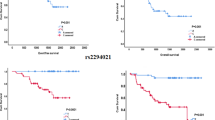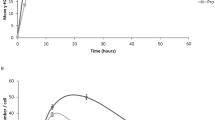Abstract
XPC, XPD, XPF, and XPG genes are implicated in the nucleotide excision repair (NER) system. Gene polymorphisms in NER repair system may influence the individual’s capacity to recognize and repair DNA lesions, thus increasing the cancer risk. We hypothesized that these gene polymorphisms might influence the probability of developing acute myeloid leukemia (AML). We investigated the XPC, XPD, XPF, and XPG gene polymorphisms in 108 AML cases and 163 healthy controls. Also cytogenetic analyses besides FLT3 and DNMT3A mutations status were investigated. We found that variant genotypes (heterozygous and homozygous) of XPD 2251A > C and 22541A > C and the heterozygous genotype of XPG 3507G > C were associated with the risk of developing AML (OR = 2.55; 95% CI = 1.53–4.25; p value <0.001; OR = 1.66, 95 % CI = 1.02–2.72; p value = 0.047, and OR = 2.36; 95 % CI = 1.32–4.21; p value = 0.004, respectively). No association was found between white blood cell counts, FLT3, DNMT3A mutations, cytogenetic risk group, and variant genotypes of none of the analyzed polymorphisms. Variant homozygous XPF 673C > T genotype was associated with higher dose of cytosine arabinoside treatment administrated to AML patients (p value = 0.04). No differences were found regarding survival time and variant genotype in the investigated gene polymorphisms with the exception of XPD 2251A > C. In conclusion, XPD 22541A > C, XPD 2251A > C, and XPG 3507G > C gene polymorphisms confer susceptibility to AML, while XPC 2920A > C, XPF-673C > T, XPF 11985A > G are not associated with AML.

Similar content being viewed by others
References
Kuptsova N, Kopecky KJ, Godwin J, Anderson J, Hoque A, Willman CL, et al. Polymorphisms in DNA repair genes and therapeutic outcomes of AML patients from SWOG clinical trials. Blood. 2007;109(9):3936–44.
Schoch C, Haferlach T. Cytogenetics in acute myeloid leukemia. Curr Oncol Rep. 2002;4(5):390–7.
Döhner K, Döhner H. Molecular characterization of acute myeloid leukemia. Haematologica. 2008;93:976–82.
Hernández-Boluda JC, Pereira A, Cervantes F, Alvarez-Larrán A, Collado M, Such E, et al. A polymorphism in the XPD gene predisposes to leukemic transformation and new nonmyeloid malignancies in essential thrombocythemia and polycythemia vera. Blood. 2012;119(22):5221–8.
El-Zein R, Monroy CM, Etzel CJ, Cortes AC, Xing Y, Collier AL, et al. Genetic polymorphisms in DNA repair genes as modulators of Hodgkin disease risk. Cancer. 2009;115(8):1651–9.
Mehta PA, Alonzo TA, Gerbing RB, Elliott JS, Wilke TA, Kennedy RJ, et al. XPD Lys751Gln polymorphism in the etiology and outcome of childhood acute myeloid leukemia: a Children’s Oncology Group report. Blood. 2006;107(1):39–45.
Kuptsova-Clarkson N, Ambrosone CB, Weiss J, Baer MR, Sucheston LE, Zirpoli G, et al. XPD DNA nucleotide excision repair gene polymorphisms associated with DNA repair deficiency predict better treatment outcomes in secondary acute myeloid leukemia. Int J Mol Epidemiol Genet. 2010;1(4):278–94.
Liu Y, Cao L, Chang J, Lin J, He B, Rao J, et al. XPF-673C > T polymorphism effect on the susceptibility to esophageal cancer in Chinese population. PLoS One. 2014;9(4), e94136. doi:10.1371/journal.pone.0094136.
Douzi K, Ouerhani S, Menif S, Safra I, Abbes S. Polymorphisms in XPC, XPD and XPG DNA repair genes and leukemia risk in a Tunisian population. Leuk Lymphoma. 2015;56(6):1856–62.
Strom SS, Estey E, Outschoorn UM, Garcia-Manero G. Acute myeloid leukemia outcome: role of nucleotide excision repair polymorphisms in intermediate risk patients. Leuk Lymphoma. 2010;51(4):598–605.
Xu P, Chen B, Feng J, Cheng L, Xia G, Li Y, et al. Polymorphisms in XPC provide prognostic information in acute myeloid leukemia. Int J Hematol. 2012;96(4):450–60.
Benhamou S, Sarasin A. ERCC2/XPD gene polymorphisms and cancer risk. Mutagenesis. 2002;17(6):463–9.
Shi JY, Ren ZH, Jiao B, Xiao R, Yun HY, Chen B, et al. Genetic variations of DNA repair genes and their prognostic significance in patients with acute myeloid leukemia. Int J Cancer. 2011;128(1):233–8.
Monzo M, Brunet S, Urbano-Ispizua A, Navarro A, Perea G, Esteve J, et al. Genomic polymorphisms provide prognostic information in intermediate-risk acute myeloblastic leukemia. Blood. 2006;107(12):4871–9.
Seedhouse C, Bainton R, Lewis M, Harding A, Russell N, Das-Gupta E. The genotype distribution of the XRCC1 gene indicates a role for base excision repair in the development of therapy-related acute myeloblastic leukemia. Blood. 2002;10:3761–6.
Sorour A, Ayad MW, Kassem H. The genotype distribution of the XRCC1, XRCC3, and XPD DNA repair genes and their role for the development of acute myeloblastic leukemia. Genet Test Mol Biomarkers. 2013;17(3):195–201.
He X-F, Liu L-R, Wei W, Liu Y, Su J, Wang S-L, et al. Association between the XPG Asp1104His and XPF Arg415Gln polymorphisms and risk of cancer: a meta-analysis. PLoS One. 2014;9(5), e88490. doi:10.1371/journal.pone.0088490.
Xu XM, Xie LC, Yuan LL, Hu XL, Jin JQ, Niu YM. Association of xeroderma pigmentosum complementation group G Asp1104His polymorphism with breast cancer risk: a cumulative meta-analysis. Mol Clin Oncol. 2014;2(6):1177–81.
Luo JF, Yan RC, Zou L. XPG Asp1104His polymorphism and gastrointestinal cancers risk: a meta-analysis. Int J Clin Exp Med. 2014;7(11):4174–82. eCollection 2014.
Allan JM, Smith AG, Wheatley K, Hills RK, Travis LB, Hill DA, et al. Genetic variation in XPD predicts treatment outcome and risk of acute myeloid leukemia following chemotherapy. Blood. 2004;104:3872–7.
Moreno I, Martin G, Bolufer P, Barragán E, Rueda E, Román J, et al. Incidence and prognostic value of FLT3 internal tandem duplication and D835 mutations in acute myeloid leukemia. Haematologica. 2003;88(1):19–24.
Brewin JN, Horne GA, Bisling KE, Stewart HJ, Chevassut TJ. Rapid detection of DNMT3A R882 codon mutations allows early identification of poor risk patients with acute myeloid leukemia. Leuk Lymphoma. 2013;54(6):1336–9. doi:10.3109/10428194.2012.736986.
Berhane N, Sobti RC, Mahdi SA. DNA repair genes polymorphism (XPG and XRCC1) and association of prostate cancer in a north Indian population. Mol Biol Rep. 2012;39(3):2471–9.
Guillem VM, Cervantes F, Martínez J, Alvarez-Larrán A, Collado M, Camós M, et al. XPC genetic polymorphisms correlate with the response to imatinib treatment in patients with chronic phase chronic myeloid leukemia. Am J Hematol. 2010;85(7):482–6.
Topinka J, Hertz-Picciotto I, Dostal M, Chvatalova I, Yap PS, Herr CE, et al. The DNA repair gene XPD/ERCC2 polymorphisms Arg156Arg (exon 6) and Lys751Gln (exon 23) are closely associated. Toxicol Lett. 2007;172(1–2):85–9.
Liu D, Wu D, Li H, Dong M. The effect of XPD/ERCC2 Lys751Gln polymorphism on acute leukemia risk: a systematic review and meta-analysis. Gene. 2014;538(2):209–16.
Wang F, Chang D, Hu FL, Sui H, Han B, Li DD, et al. DNA repair gene XPD polymorphisms and cancer risk: a meta-analysis based on 56 case–control studies. Cancer Epidemiol Biomarkers Prev. 2008;17:507–17.
Özcan A, Pehlivan M, Tomatir AG, Karaca E, Özkınay C, Özdemir F, et al. Polymorphisms of the DNA repair gene XPD (751) and XRCC1 (399) correlates with risk of hematological malignancies in Turkish population. Afr J Biotechnol. 2011;10(44):8860–70.
Xu Y, Jiao G, Wei L, Wang N, Xue Y, Lan J, et al. Current evidences on the XPG Asp1104His polymorphism and melanoma susceptibility: a meta-analysis based on case–control studies. Mol Genet Genomics. 2015;290(1):273–9.
Acknowledgments
This work was supported by Internal Research Grants of the University of Medicine and Pharmacy Tîrgu Mureş, România. Project No. 19/11.12.2013.
Authors’ contributions
CB designed the study, performed genetic investigations of individuals included in the study, and wrote the manuscript. APT also designed the research and critically revised the manuscript. CD, VGM, FT, AC, and AB performed genetic analysis and collected the data from controls. Statistical analysis was performed by MI. CS and MD participated to the design of the study and performed critical revisions of the manuscript. EL collected data and blood samples from the AML cases and was implicated in the design of the study. The final version of the manuscript was read and approved by the authors.
Author information
Authors and Affiliations
Corresponding author
Ethics declarations
Our research was conducted according to the principles of the Helsinki Declaration and an informed consent was obtained from all individuals included in the present study.
Conflicts of interests
None
Ethical approval
“All procedures performed in studies involving human participants were in accordance with the ethical standards of the institutional research committee and with the 1964 Helsinki declaration and its later amendments or comparable ethical standards.”
Additional information
Claudia Bănescu, Mihaela Iancu and Adrian P. Trifa contributed equally to this work.
Rights and permissions
About this article
Cite this article
Bănescu, C., Iancu, M., Trifa, A.P. et al. Influence of XPC, XPD, XPF, and XPG gene polymorphisms on the risk and the outcome of acute myeloid leukemia in a Romanian population. Tumor Biol. 37, 9357–9366 (2016). https://doi.org/10.1007/s13277-016-4815-6
Received:
Accepted:
Published:
Issue Date:
DOI: https://doi.org/10.1007/s13277-016-4815-6




